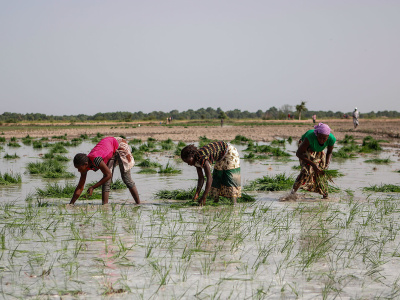
Rice trade and value chain development in West Africa: An approach for more coherent policies
The development of the rice sector in West Africa represents a significant policy challenge. ECDPM and IPAR have looked at how a better regulation of markets and trade in the region could contribute to a more competitive and sustainable rice sector.
This page is also available in French.
Summary
The development of the rice sector in West Africa represents a significant policy challenge. Following the 2008 food price crisis, West African countries succeeded in boosting rice production. Yet, with little improvement in the competitiveness of the sector, they continued to import increasing amounts of rice, exposing them to international market volatility.
Trade policies have contributed to this outcome. Low import protection, compared to Asian producers, has been a major factor, as smuggling activities between countries with different tariff levels show. Tax exemptions often arbitrarily granted to rice importers have undermined the stability of domestic markets. Weak enforcement of quality and food safety norms have allowed for the importation of substandard rice, unfairly competing with West African farmers.
Besides official policies, complex and interlocking interests among private and public actors drive rice trading activities. The importation and distribution of rice, which generates sizable rents, is supported by powerful economic and political actors.
Nonetheless, recent developments suggest that progress in the regulation of rice markets and the development of competitive and inclusive value chains is achievable. It requires an alignment of interests, the promotion of coherent policies linking a stricter regulation of imports to the structuring of domestic markets, and incentives for private investment.
Building on existing dynamics in cross-border regions, trade facilitation could further contribute to the emergence of modern value chains and food security. Scaling up promising experiments in market and trade regulation, while developing the rice sector as part of more sustainable agri-food systems, also depends on the interests of different states in better coordinating national rice policies and implementing regional trade agreements.
This paper was presented during a webinar on rice sector development and trade policies in West Africa, organised by ECDPM and IPAR on 22 October.





